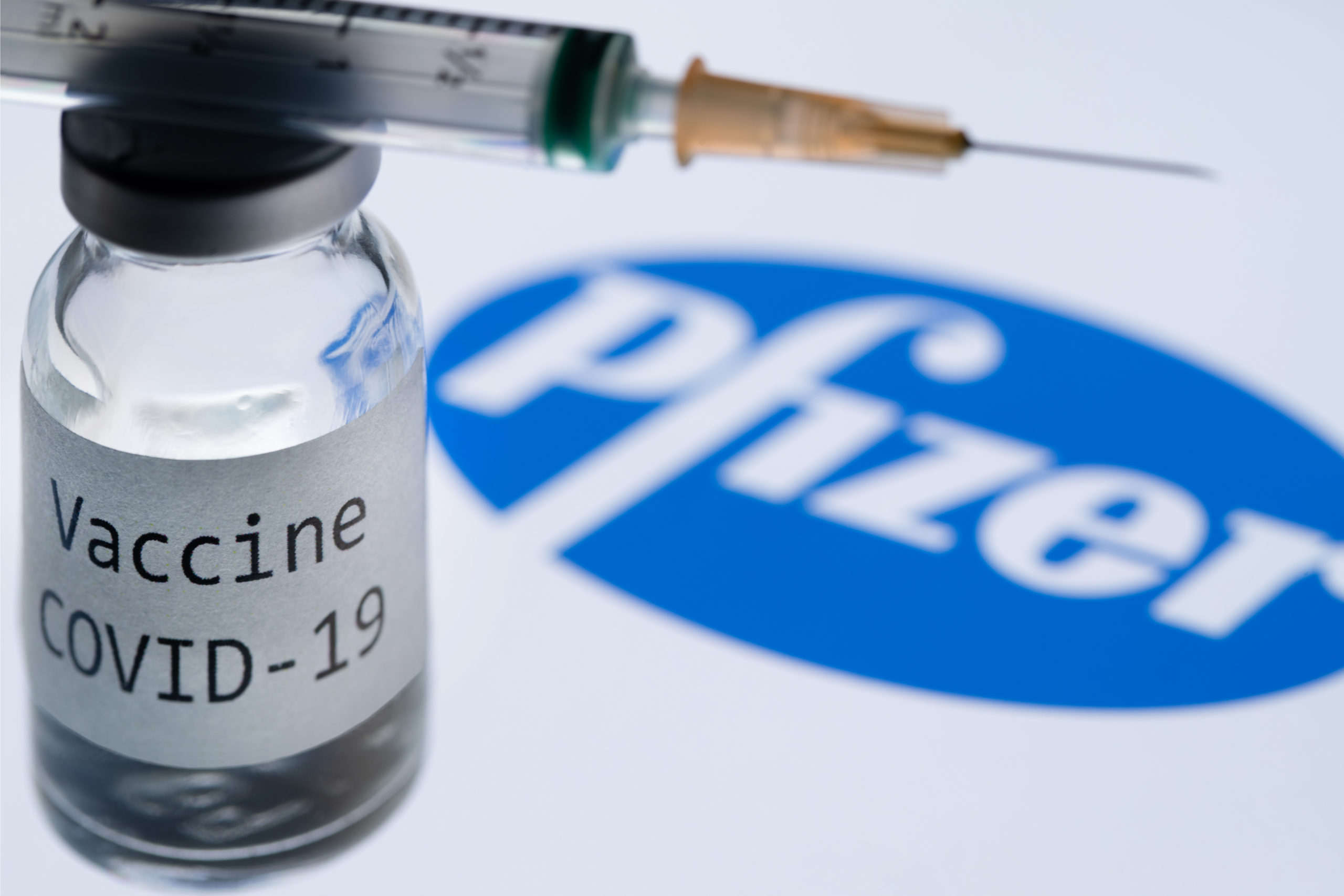US experts vote to approve Pfizer vaccine

(FILES) In this file photo illustration taken on November 23, 2020, shows a syringe and a bottle reading “Covid-19 Vaccine” next to the Pfizer company logo. – An expert committee convened by the US Food and Drug Administration on December 10, 2020, voted heavily in favor of recommending the Pfizer-BioNTech Covid-19 vaccine for emergency use approval. (Photo by JOEL SAGET / AFP)
WASHINGTON — US experts voted Thursday to recommend granting emergency approval for Pfizer-BioNTech’s COVID-19 vaccine, paving the way for America to become the next country to move ahead with mass immunization.
It comes as the worst-hit country in the world logged nearly 6,000 virus deaths in 48 hours and its overall toll was approaching 300,000.
With northern hemisphere countries hit by a pandemic winter surge, Britain this week became the first Western country to roll out the Pfizer-BioNTech vaccine.
Canada, Bahrain, and Saudi Arabia have also approved it.
EU countries eagerly awaited clearance for vaccines that the bloc’s own watchdog said remained on track for approval despite a two-week-long cyber attack, which is under investigation.
Article continues after this advertisementBut another vaccine development effort suffered a setback as France’s Sanofi and Britain’s GSK said their jab will not be ready until the end of 2021 after interim results showed a low immune response in older adults.
Article continues after this advertisementAlthough the vote by independent experts convened by the US Food and Drug Administration (FDA) on the Pfizer-BioNTech vaccine is non-binding, a formal emergency use authorization (EUA) is expected within days.
Momentum was building as the New England Journal of Medicine published full results of a clinical trial of the vaccine involving nearly 44,000 people, which confirmed it was 95 percent effective with no serious safety issues.
Nevertheless, the voting members of the Vaccines and Related Biological Products Advisory Committee (VRBPAC) mulled outstanding issues closely in a live-streamed event held over the course of the day.
Difficult remaining questions include when to vaccinate those who got placebos in the trial — balancing reward versus gathering more valuable control data — and whether unexpected safety issues may arise when the number of people vaccinated grows to millions and possibly billions of people.
Also unknown is whether more side effects will emerge with longer follow-up, how long the vaccine remains effective, whether it will limit transmission and how it will work in children, pregnant women, and immunocompromised patients.
The FDA said it would issue an allergy warning following Britain’s lead after two health care workers there suffered reactions and needed treatment.
‘Bright light’
The virus has killed at least 1,570,398 people worldwide since the outbreak emerged in China last December, according to an AFP tally from official sources.
The US hopes to vaccinate 20 million people this month, with long-term care facility residents and health workers at the front of the line.
President-elect Joe Biden called the FDA experts’ decision a “bright light in a needlessly dark time.”
The first vaccine shipments to 14 sites across Canada are scheduled to arrive Monday with people receiving shots a day or two later.
Health care workers and vulnerable populations including the elderly are to be the first to receive it.
“I’m really excited. I want to get vaccinated as soon as possible because I have a new baby,” Michelle, a Toronto resident, told AFP.
Israel accepted its first shipment of the Pfizer vaccine on Wednesday, targeting a rollout on December 27.
Both Russia and China have already begun inoculation campaigns with domestically produced vaccines despite far less vetting.
Argentina’s President Alberto Fernandez said Thursday he would be the first person in his country to be injected with Russia’s Sputnik V coronavirus vaccine in order to dispel public fears.
But the development of a COVID-19 vaccine in Australia was abandoned after clinical trials produced a false positive HIV result among subjects involved in early-stage testing.
Meanwhile, Sanofi-GSK said their vaccine candidate produced a “low immune response” in people over 49 and improvements will take until the fourth quarter of 2021.
They added that they still have “confidence in the capacity of the adjuvanted recombinant platform,” built on technology that Sanofi has used to produce seasonal influenza vaccines and immunological agents developed by GSK.
Hamilton back on track
The European Medicines Agency has promised to reach a decision on conditional approval for the Pfizer-BioNTech vaccine by December 29, with a ruling on Moderna’s candidate to follow by January 12.
There was good news in France, which announced it would lift a six-week-long lockdown from Tuesday but impose a curfew from 8 pm, including on New Year’s Eve.
But Germany, which had been hailed as a European leader in fighting the virus, saw the death toll pass 20,000 with the head of its disease control agency saying infections are taking a worrying turn.
European Central Bank chief Christine Lagarde unleashed more stimulus on Thursday to help the eurozone confront a second coronavirus wave, and warned that the outlook remained fraught with uncertainty over the pandemic’s evolution and the rollout of vaccines.
Formula One world champion Lewis Hamilton meanwhile was given the green light to return to racing at the season-ending Abu Dhabi Grand Prix after recovering from his own bout with the virus.
/MUF
For more news about the novel coronavirus click here.
What you need to know about Coronavirus.
For more information on COVID-19, call the DOH Hotline: (02) 86517800 local 1149/1150.
The Inquirer Foundation supports our healthcare frontliners and is still accepting cash donations to be deposited at Banco de Oro (BDO) current account #007960018860 or donate through PayMaya using this link.